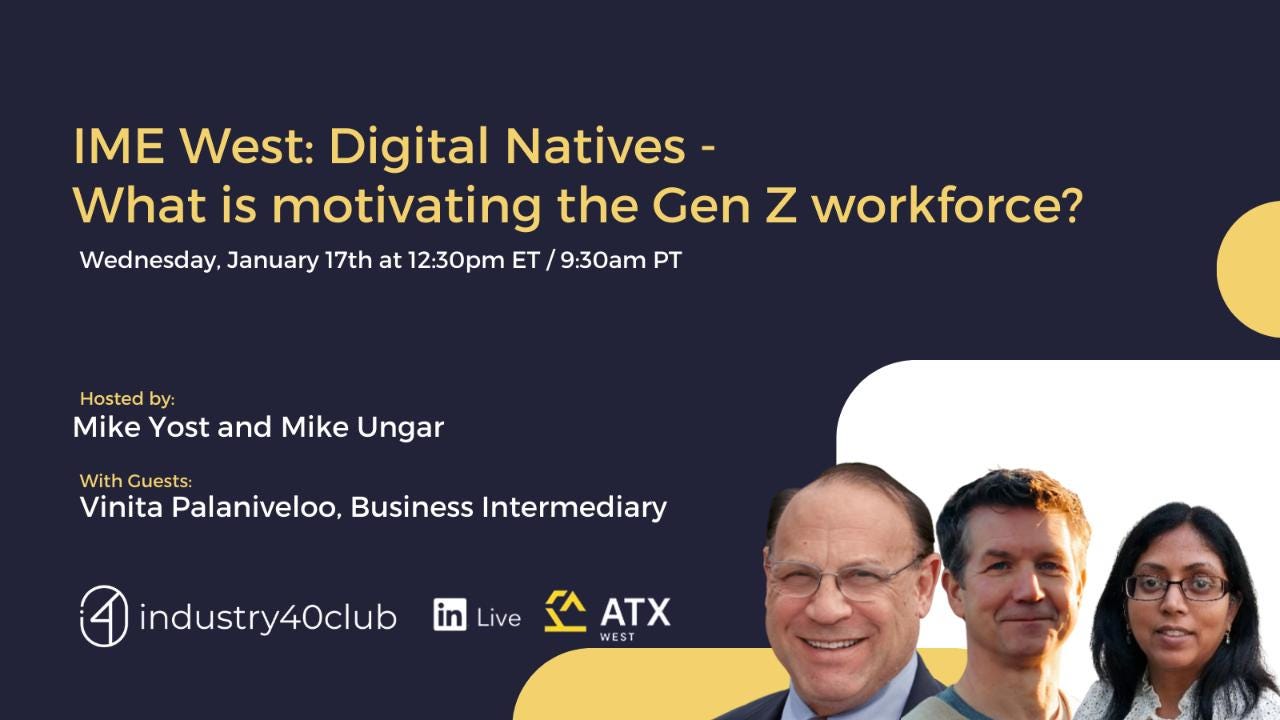🚀 Shaping the Future - Issue 26
We unveil the eighth reveal of the Advanced Engineering sessions scheduled for ATX West, set to unfold in Anaheim, California, from February 6-8, 2024.
🚨 The Industry 4.0 Club will be at ATX West
ATX West returns to Anaheim, California, on February 6-8, 2024, uniting the greatest minds in automation to advance manufacturing excellence. The Industry 4.0 Club will be hosting the Advanced Engineering panels.
Stay tuned over the next few weeks as we keep unveiling the distinguished guests and topics to be featured at the conference. Don't miss out – registration is now open. Secure your spot to be part of this conference.
🧠 IME West Preview: Center Stage
Industry 4.0 Club’s own Mike Ungar and Mike Yost are set to present at the upcoming ATX West conference, focusing on the convergence of lean and Industry 4.0. During last week’s Fireside Chat, stressed about the importance of embracing digital capabilities for competitiveness, advocating practical steps and collaboration between IT, operations, and continuous improvement teams. The ATX West Advanced Manufacturing Track, hosted by the Industry 4.0 Club and featuring over a dozen speakers on Industry 4.0 topics is set to be an important event for manufacturers seeking to navigate the intersection of lean principles and Industry 4.0 advancements.
Registration is now open. You can secure your spot to attend the workshop here, listen to the conversation below or watch the show here.
📣 Preview of Upcoming Advanced Engineering Sessions at ATX West 2024
We unveil the eighth reveal of the Advanced Engineering sessions scheduled for ATX West, set to unfold in Anaheim, California, from February 6-8, 2024.
📌 Title: Digital Natives: What’s motivating the Gen-Z workforce?
📝 Abstract: Gen Z, constituting approximately 20% of the U.S. population, stands out as a diverse and digitally native generation, deeply affected by the internet and marked by heightened awareness of social and environmental issues. Shaped by experiences like the COVID-19 pandemic, they prioritize financial stability, smart investments, and value job flexibility. Gen Z professionals, entering the workforce during the pandemic, exhibit a willingness to job-hop, seeking a positive company culture, competitive salary, and flexibility in work arrangements. For the manufacturing industry, traditionally reliant on in-person work, adapting to Gen Z's expectations involves addressing their desire for autonomy, holistic well-being support, and creating environments that align with their values for a sustainable and fulfilling career.
This panel is an effort to talk to understand what we could do to in the manufacturing workplace to retain Gen z in an effort for America’s manufacturing renaissance.
💁♀️Panel Moderator and Panelists: Vinita Palaniveloo, Business Intermediary - Moderating; Salma Arellano, Electrical Engineer - Panelist; Jenni Asaro, New Product Introduction Engineer - Panelist; Tarun Anirodh, Mechanical Engineer - Panelist; Marleigh Saenz, R&D Engineer - Panelist
✍️ Bio: Vinita was born and raised in India and later decided to make the world her home. She obtained a Ph.D. in Computer Science and Engineering from The University of New South Wales, Sydney. She was part of the AI & ML group at the university to research the application of a formal methodology for electronic design automation. She first got introduced to robotics at the university. Technology and problem-solving make her tick. She is ready to climb every mountain and knock on every door to accomplish a mission. As an immigrant and a mother, she understands the dilemma of women choosing between family and love for the profession. At SWE, she is passionate about creating programs to support women's reentry into the workforce after a break.
📚What we’ve read this week
Metal AM Report [Voxel Matters]
Currently valued at around $2.8 billion, the metal AM market is a small fraction of the overall metal manufacturing market. However, it is expected to grow substantially, to $40.3 billion within the next decade. Today, the industry is transitioning from small-batch to medium-batch and large-batch production of final parts, promising scalability, efficiency, and environmental sustainability. Additionally, companies are focusing on developing and optimizing metal alloys for industrial use cases, leading to a rapid expansion of available materials across aerospace, automotive, medical, maritime, and energy.
Additive Manufacturing in 2024 [Voxel Matters]
As we unwrap the new year, industry experts foresee significant opportunities in additive manufacturing (AM) for 2024. Key areas include technology integration, new materials, and smarter factories. Many experts highlight the role of AI in advancing AM. ChatGPT, an AI, identifies ongoing trends in AM but emphasizes that expert human analysis remains irreplaceable.
JPM2024: Manufacturing outlook for transformative technologies [Hogan Lovells]
Cell, tissue, and gene therapies (CTGT) offer potential for personalized medicine in challenging disease cases. Radiopharmaceuticals and custom medical devices show promise but demand precision due to time sensitivity. Despite high costs and logistical challenges, interest persists in these technologies. Challenges include specialized therapy manufacturing, partnerships, and safety in the unique point-of-service supply chain, necessitating an integrated approach to distribution and manufacturing.
India Wanted a Manufacturing Boom, Workers Are on the Farm Instead [WSJ]
The 2020 lockdown prompted a rural exodus in India, shifting workers from cities back to rural areas. Despite the pandemic's easing, India's farm sector gained 13 million workers, fueled by Narendra Modi's extension of a crucial food program. However, manufacturing jobs remained stagnant, contributing to a premature deindustrialization trend. Contrary to expectations, India's farm workforce expansion poses risks to labor utilization and economic growth potential, as manufacturing's contribution to GDP declined from 17% to 13% in 2022. Worker preferences for less labor-intensive sectors, such as information technology and financial services, seem to influence India's economic growth more than its manufacturing aspirations.
EDF Analysis on U.S. Electric Vehicle Battery Manufacturing [EDF
The Environmental Defense Fund (EDF) analysis reveals that the U.S. already has ample battery production capacity to meet the anticipated demand for electric vehicles (EVs) in 2030. Over 1,000 gigawatt hours per year of EV battery production capacity are expected to be online by 2028, powering 10 million electric cars, surpassing EPA projections. The EV market's rapid growth is evident, with electric vehicles comprising 12% of all U.S. vehicle production in 2023, a 70% increase from the previous year. The announced battery manufacturing is domestic, showcasing U.S. self-sufficiency, with key states including Michigan, Georgia, Tennessee, Kentucky, and Indiana participating.
🎤 Upcoming Events
👋 Get Involved
Join the Industry 4.0 Club and be part of our vibrant community, dedicated to shaping the future of manufacturing. By actively participating, you can make a meaningful impact in advancing Industry 4.0 and contribute to reshaping the manufacturing landscape.
We’re always looking for new contributors to share their expertise, experience and spread the word. You can contact us directly at info@industry40club.com with subject like “Getting Involved” and follow us on all social media (LinkedIn & Twitter) or donate to help fund the club’s activities.
💬 About Shaping the Future
Shaping the Future is Industry 4.0 Club’s official newsletter. We’ll be experiencing different formats over the coming weeks until we find the one that resonates the most with our members. You can help us improve by sharing feedback and suggestions. The newsletter will land in your inbox every Sunday morning; please subscribe to not miss anything and forward the email to someone you think would benefit from this.
If you were forwarded this and found it interesting, please subscribe and share!







